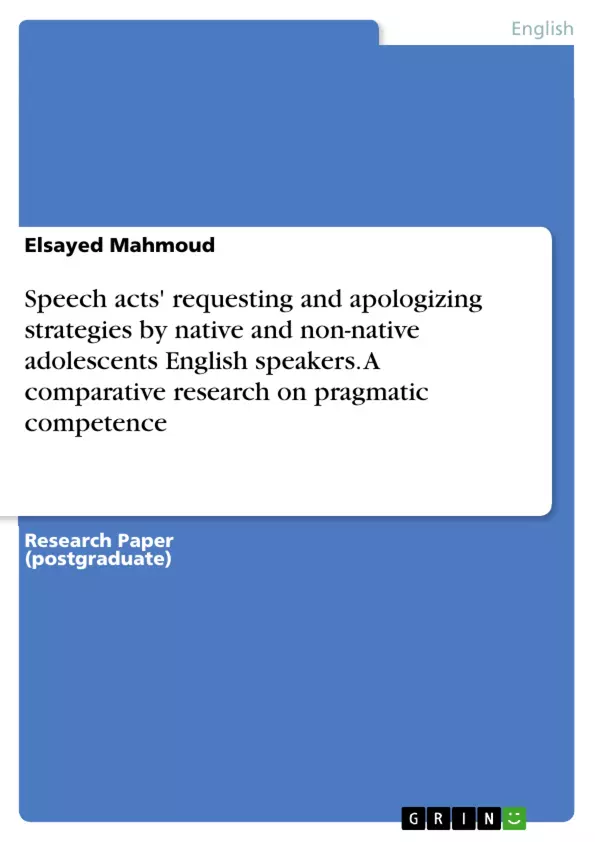Considering the importance of pragmatic competence, this paper analyzed the speech acts for requesting and apologizing strategies between native and non-native speakers of English. To analyze written discourse in the classrooms, four international secondary schools in Dubai, UAE have been selected. The study was conducted in the second semester of the academic year 2012-2013. The study is not controlled for gender as this factor does not have a significant impact on this study, while the age is controlled. In order to analyze written discourse, a mixed methods research for speech acts of requests and apologies was applied.
To this end, the DCT of Blum-Kulka et al. was adapted and developed by the researcher. Every DCT contains eight scripted scenarios for requests and the same number of scripted scenarios for apologies. Each describes situations that specify social distance, imposition and power between the participants. The dependent variables are requests and speech act sets of apologies, while the independent variables are social distance, size of imposition, power. In this study, all these variables could be low (L) or High (H).The data revealed that there are some similarities between the participants, supporting the fact that there are universal politeness strategies. However, the data also revealed some differences between the native and non-native speakers' strategies.
Inhaltsverzeichnis (Table of Contents)
- Background of the Study
- Introduction
- A rationale for the choice of topic
- Purpose of the Study
- Questions of the study
- Literature Review
- Communicative competence and pragmatic competence
- Interlanguage pragmatics
- Cross-Cultural pragmatics
- Speech Act theory
- Politeness Theory
- International and local Cultural Studies
- Methodology
- Data collection and Data analysis
- The adaptation of the Discourse completion test
- Samples
- Findings of requesting and apologizing strategies
- Discussion
- Pedagogical Implications
Zielsetzung und Themenschwerpunkte (Objectives and Key Themes)
This research paper aims to identify and compare the speech acts' requesting and apologizing strategies used by 13-15 year-old native and non-native speakers of English based on pragmatic competence. This study investigates the influence of cultural differences on the use of speech acts in written discourse. The main objectives are to present communicative competence and its components and consequences, to define pragmatic competence, speech acts, and speech events, and to explore the influence of social distance, size of imposition, and power on the production of requests and apologies.
- The importance of pragmatic competence in second language learning
- Cultural differences in speech act realization strategies
- The impact of social distance, size of imposition, and power on speech act production
- The use of the Discourse Completion Test (DCT) as a research tool
- The role of politeness theory in explaining speech act variations
Zusammenfassung der Kapitel (Chapter Summaries)
The first chapter provides an introduction to the topic, the rationale for the study, its purpose, and the research questions. Chapter two presents a review of relevant literature, focusing on communicative competence, pragmatic competence, interlanguage pragmatics, cross-cultural pragmatics, speech act theory, politeness theory, and international and local cultural studies. Chapter three outlines the methodology of the study, including the data collection methods, data analysis techniques, the adaptation of the DCT, and the characteristics of the study participants. The fourth chapter presents the findings of the study, highlighting the differences and similarities in requesting and apologizing strategies between native and non-native English speakers.
Schlüsselwörter (Keywords)
This research focuses on the comparative analysis of speech acts, specifically requesting and apologizing strategies, produced by native and non-native English adolescents. It explores pragmatic competence as a key factor influencing speech act realization within a cross-cultural context. The study also examines the influence of social distance, size of imposition, and power on speech act production and investigates the use of the Discourse Completion Test (DCT) as a research tool. Key concepts include communicative competence, pragmatic competence, politeness theory, and cultural variations in language use.
Frequently Asked Questions
What is the focus of this comparative research on English speakers?
The study analyzes and compares the speech acts of requesting and apologizing between native and non-native English-speaking adolescents (aged 13-15).
What is "pragmatic competence" in language learning?
Pragmatic competence is the ability to use language effectively in a social context, understanding how to realize speech acts like requests and apologies appropriately based on the situation.
What methodology was used to collect data from the students?
The researcher used an adapted version of the Discourse Completion Test (DCT) by Blum-Kulka, containing scripted scenarios for requests and apologies.
Which social variables influence the choice of speech act strategies?
The study examines three main independent variables: social distance between participants, the size of the imposition, and the relative power of the speaker versus the listener.
Where was the study conducted and with which participants?
The research was conducted in four international secondary schools in Dubai, UAE, during the 2012-2013 academic year.
Did the results show differences between native and non-native speakers?
Yes, while there were similarities due to universal politeness strategies, the data revealed significant differences in the specific realization strategies used by native versus non-native speakers.
- Quote paper
- Elsayed Mahmoud (Author), 2013, Speech acts' requesting and apologizing strategies by native and non-native adolescents English speakers. A comparative research on pragmatic competence, Munich, GRIN Verlag, https://www.grin.com/document/351007



